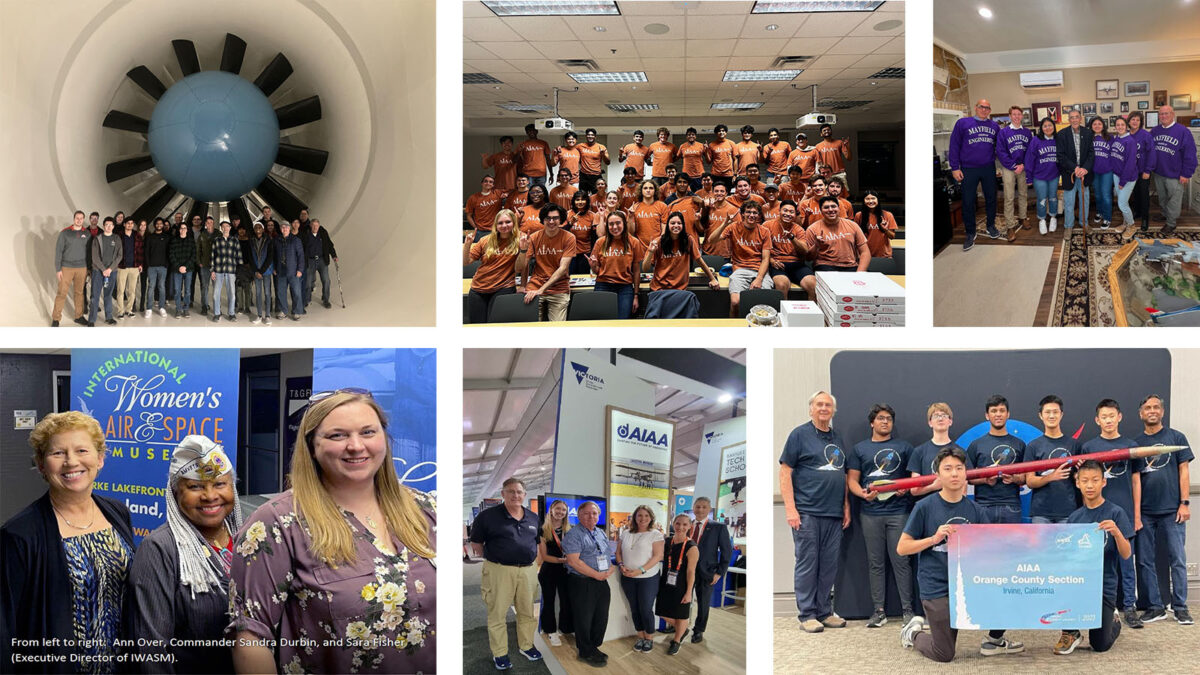- Making an Impact: AIAA Announces Winners of Prestigious Zarem Graduate Student Awards for Distinguished Achievement
- AIAA Announces 2024 Design/Build/Fly Draft Rules and Mission
- Fall AIAA Foundation News for K-12 Educators
- North Texas Section Completes Annual STEM Event at Moon Day
- Diversity Corner
- AIAA Associate Fellow Ferguson Died in October 2022
- AIAA Senior Member Goldman Died in June 2023
- AIAA Senior Member Burke Died in August 2023
- AIAA Announces 2022-2023 Section Award Winners
Bulletin
AIAA Foundation Making an Impact: AIAA Announces Winners of Prestigious Zarem Graduate Student Awards for Distinguished Achievement
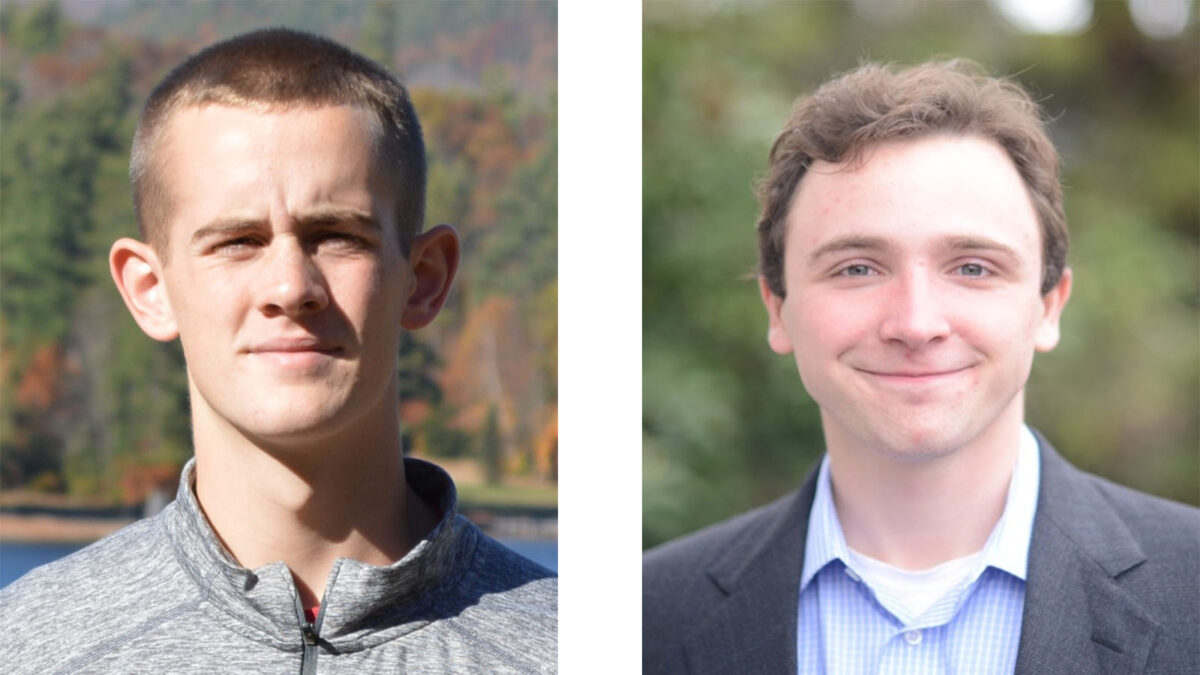
AIAA is pleased to announce the winners of the Zarem Graduate Student Award for Distinguished Achievement:
Stephen Monroe, Clarkson University, won the aeronautics award for his paper, “Parallel Unsteady Reynolds-Averaged Navier-Stokes (URANS) Studies of the Performance of ONR Waterjet AxWJ-2.” Monroe will present his paper at the 2024 International Congress of the Aeronautical Sciences (ICAS) in Florence, Italy, 9-13 September 2024.
Quentin Roberts, University of Washington, won the astronautics award for his paper, “Investigation of Pre-Ignition Propellant Mixing in Rotating Detonation Rocket Engine.” Roberts will present his paper at the 2023 International Astronautical Congress (IAC) in Baku, Azerbaijan,
2-6 October 2023.
The winners will receive their awards at the 2024 AIAA SciTech Forum, Orlando, Florida, 8–12 January 2024. This award was established by AIAA Honorary Fellow Abe Zarem, founder and managing director of Frontier Associates, to annually recognize graduate students in aeronautics and astronautics who have demonstrated outstanding scholarship in their field.
Aeronautics
Stephen Monroe just completed his first year as an M.S. student in Mechanical Engineering at Clarkson University. He received his B.S. from Clarkson University in 2022. In his senior year, Monroe began learning CFD algorithms and HPC in the research group of Professor Chunlei Liang. During the first year of graduate study, Monroe conducted URANS studies of an ONR waterjet propulsion unit on parallel computers. He also is performing large eddy simulations of the same propulsion system to examine finer flow structures. Monroe is determined to become a skillful computational fluid dynamicist in large eddy simulations using an open-source code before completing his M.S. program. While uncertain about his future in academia, Monroe intends on using the skills he has developed to become a proficient propulsion system designer.
“Coming into the Graduate School, I only intended on achieving an M.S. degree. Having being recognized for my hard work by the Abe Zarem award, not only has my passion for research been rejuvenated, but my consideration of furthering my education has as well,” said Monroe.
Monroe’s faculty advisor, Chunlei Liang, is Professor of Mechanical and Aerospace Engineering at Clarkson University. He received his Ph.D. from the University of London in 2005. Liang is an ASME Fellow and an AIAA Associate Fellow.
Astronautics
Quentin Roberts is an M.S. student at the University of Washington studying aeronautics and astronautics with a concentration in fluids. His research is on injector mixing in rotating detonation rocket engines (RDREs). Roberts will start work in fall 2023 as a propulsion analyst at Blue Origin.
“Receiving this award will allow me to greatly expand my horizons in the world of astronautics by not only providing an opportunity to learn about what research the international community is working on, but also an opportunity to present my own research to an international audience,” said Roberts.
Roberts’ faculty advisor, Carl Knowlen, received his bachelor’s and master’s degrees in Aeronautical and Astronautical Engineering from the University of Washington in 1983 and 1985, respectively. He continued with his graduate research on ram accelerators at the UW and completed his Ph.D. program in 1991. Dr. Knowlen then accepted a Postdoctoral Research Associate position with the UW Department of Aeronautics and Astronautics where he expanded his research endeavors to include shockwave chemical reactors. He has been teaching AA Department courses on a regular basis since 2002 and was appointed to his current position as a Research Associate Professor in 2015.
For more information on the Abe M. Zarem Graduate Awards for Distinguished Achievement, please contact Michael Lagana at michaell@aiaa.org or 703.264.7503.
AIAA Foundation AIAA Announces 2024 Design/Build/Fly Draft Rules and Mission
Teams are invited to participate in the 28th annual AIAA Design/Build/Fly (DBF) competition, 18–21 April 2024, in Wichita, KS. This year’s objective is to design, build, and test an airplane to demonstrate Urban Air Mobility (UAM) missions. Flight missions will include delivery of the airplane, medical transport, and urban taxi. The goal is a balanced design possessing good demonstrated flight handling qualities, and practical and affordable manufacturing requirements while providing a high vehicle performance.
The 2024 rules document can be found at aiaa.org/dbf. Proposal submissions will be accepted from 15 October, 0800 hrs ET USA, to 31 October 1700 hrs ET USA.
AIAA Foundation Fall AIAA Foundation News for K-12 Educators
2024 AIAA Trailblazing STEM Educator Award Applications Open
The Trailblazing STEM Educator Award, sponsored by AIAA and Challenger Center, celebrates three K-12 educators who go above and beyond to inspire the next generation of explorers and innovators in science, technology, engineering, and mathematics.
The award winners receive $5,000 for the educator, $5,000 for the educator’s school or organization, an all-expense paid trip to Washington, DC, to be honored at the AIAA Awards Gala, and free access to Challenger Center’s STEM education programs.
Details at http://aiaa.org/trailblazingstemeducatoraward.
AIAA Roger W. Kahn Scholarship
AIAA will award four $10,000 scholarships to current high school seniors who plan to study aerospace engineering at a college or university in fall 2024. AIAA will also provide an all-expense paid trip to Washington, DC, to attend the AIAA Awards Gala, where we recognize top aerospace professionals and contributors to the aerospace community. Each student also will be provided with a mentor from AIAA’s professional members to help guide the students to achieve a career in aerospace.
Details of the eligibility and requirements can be found at
aiaa.org/kahnscholarship. Applications Close: 31 December 2023.
North Texas Section Completes Annual STEM Event at Moon Day
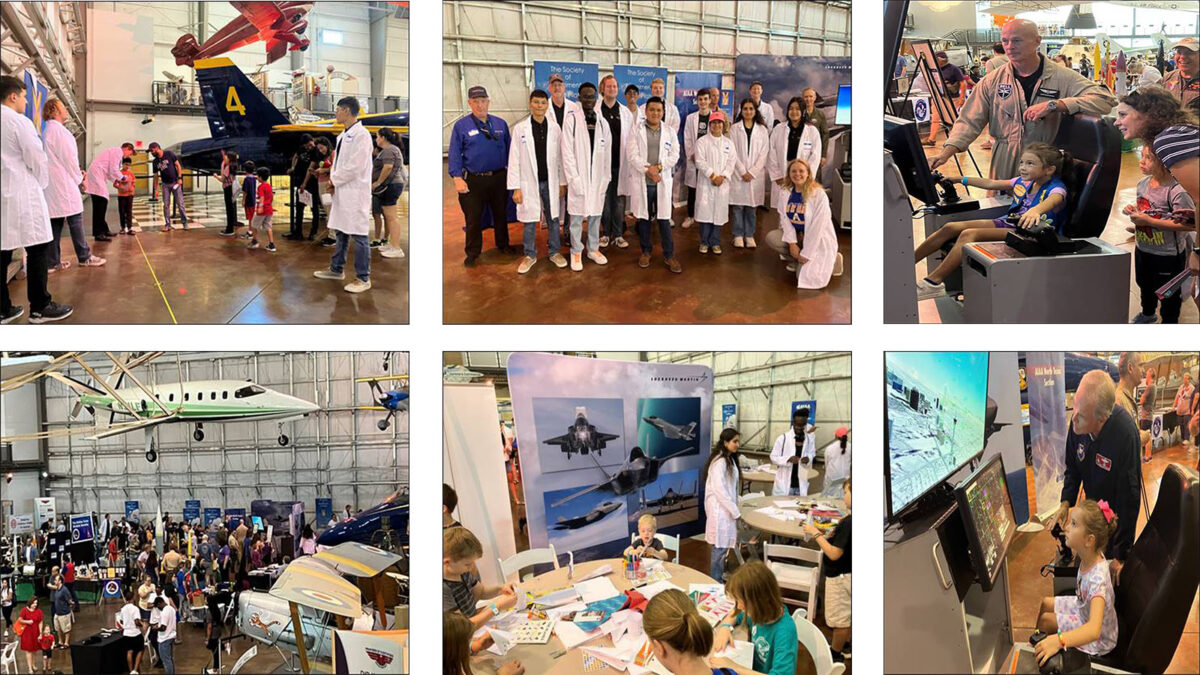
The AIAA North Texas Section supported the Moon Day STEM event on 22 July 2023 at the Frontiers of Flight Museum at Dallas Love Field in cooperation with the SETP Southwest Section, AIAA University of Texas at Arlington/University of Texas at Dallas Student Branches, and the University of Texas at Arlington Aero Mavs rocket team. The museum hosts the annual event to inspire kids in the STEM fields with aviation-themed activities, displays (including the Apollo 7 command module) and speakers, including retired NASA astronaut Shane Kimbrough.
Twenty-five volunteers from Lockheed Martin, Bell, Virgin Galactic, Airborne Tactical Advantage Company, FAA, and the GAO participated as the children designed and constructed their own paper airplanes, flew them on the flight test range to measure time aloft and distance, and then computed the resultant velocity in English and metric units. The students also were able to fly an F-35 simulator provided by Lockheed Martin. Participating AIAA members were Kevin Christensen, Jason Daugherty, Felipe Flores-Mendoza, Mike Fox, Chlois Hill, Derek Jackson, Dana Johnson, Chi Mai, Erasmo Pinero, James Sergeant, and Bob Wetherall.
Member News Diversity Corner
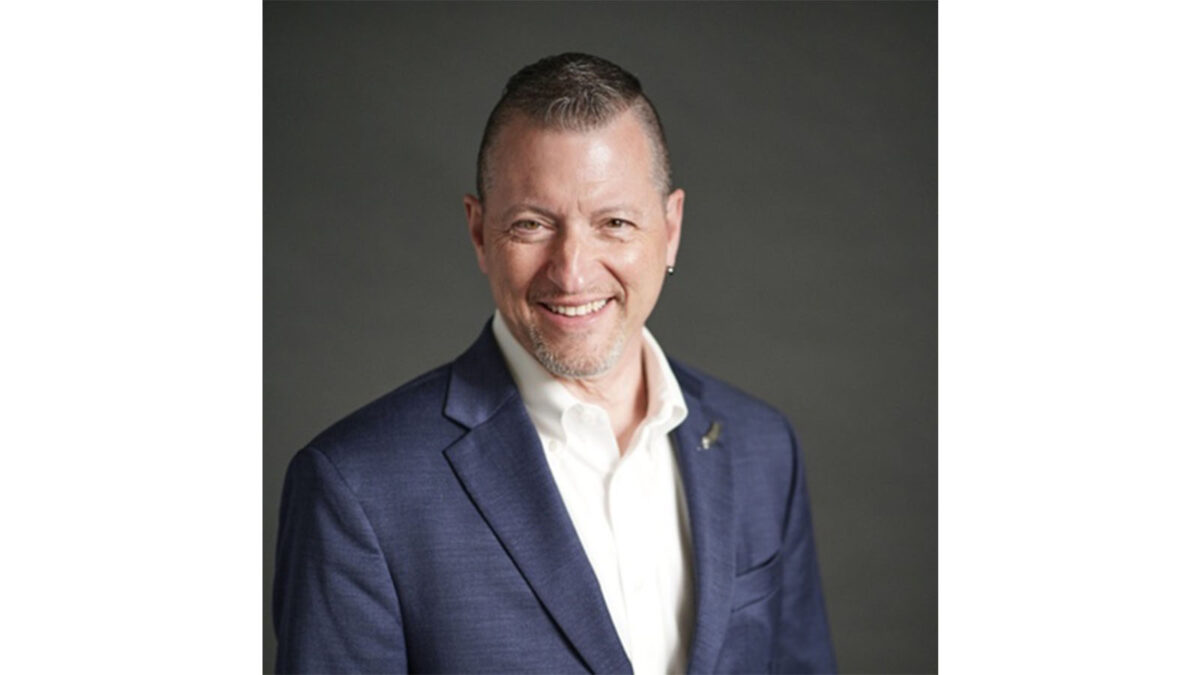
Name: Brent Sherwood, AIAA Associate Fellow
Notable Contributions: A space architect, Sherwood is in his third space career. At Boeing for 17 years, he led development of human exploration system concepts, Space Station manufacturing methods, and multiple business growth strategies. At the Jet Propulsion Laboratory for 14 years, he led creation of the JPL Innovation Foundry and the winning proposals for InSight, Psyche, and Cassini’s final mission extensions. Now at Blue Origin, he is senior vice president for Space Systems Development and executive sponsor (and member) of New Ride, the company’s LGBTQ business resource group. He grew Blue Origin SSD’s in-space business from $50M to $1B in less than four years. This included winning NASA contracts to develop the Blue Moon lunar lander, Orbital Reef commercial space station, and Blue Alchemist technology for making solar cells from lunar regolith, plus formulation of multiple company-funded system developments. Extensively published in the exploration and development of space, he is the 2020 recipient of the American Society of Civil Engineers Columbia Medal, a Corresponding Member of the International Academy of Astronautics, former board member of the American Astronautical Society, and has served on several NASA strategic planning panels. His M.S. is from the University of Maryland, and his M.Arch. is from the Yale School of Architecture.
Potential Societal Impact of Contributions: The human breakout into space will make the energy and material resources of space available for endless human opportunity. Civilization can then grow without limit, preserving Earth and seeding the universe with life.
*In collaboration with the AIAA Diversity and Inclusion Working Group and Claudine Phaire, the AIAA Society and Aerospace Technology Outreach Committee is highlighting prominent members of the wider aerospace community in the Diversity Corner.
Obituary AIAA Associate Fellow Ferguson Died in October 2022
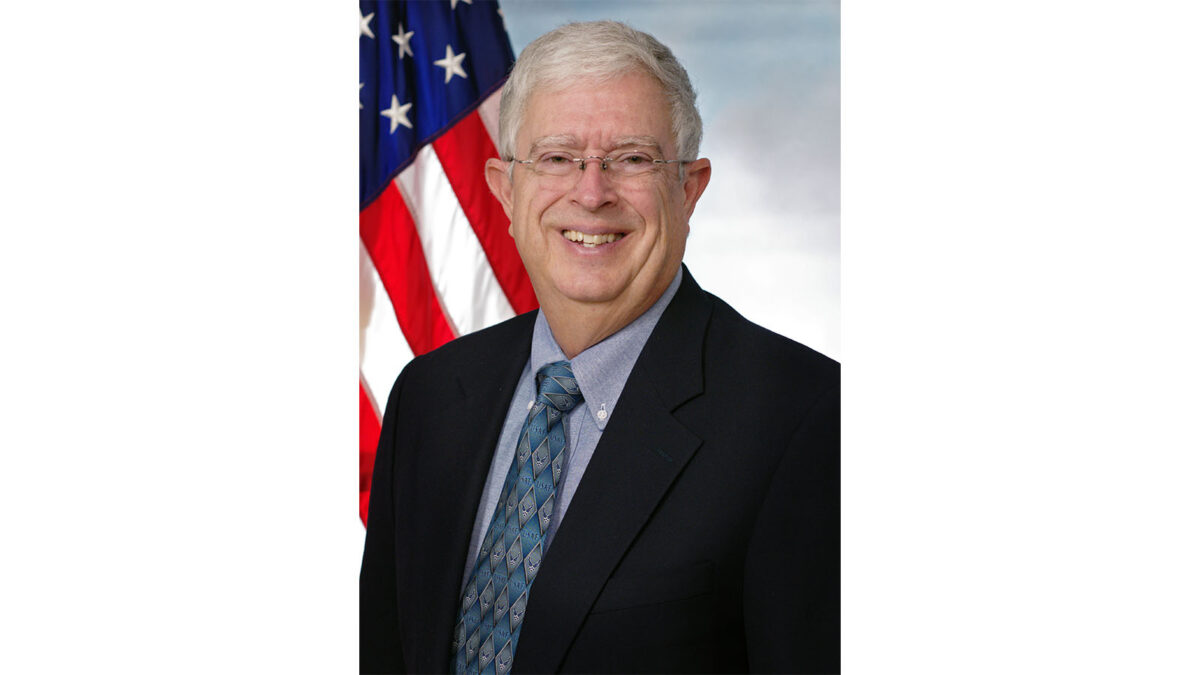
Dale C. Ferguson died in October 2022.
In 1970, Ferguson graduated with high honors from Case Western Reserve University, with a B.S. in Astronomy and received the Jason J. Nassau Prize in Astronomy. In 1974, he received his Ph.D. in Astronomy from the University of Arizona, Tucson.
Ferguson worked at NASA Lewis Research Center (now NASA Glenn) and with the Marshall Space Flight Center before moving to the Air Force Research Laboratory in Albuquerque, NM. Ferguson was the Principal Investigator on one of the Mars Pathfinder Sojourner Rover technology experiments, the Wheel Abrasion Experiment. He was the deputy for Space Environments in the Photovoltaics and Space Environments Branch at the NASA Lewis Research Center. Over the years he also taught or had done research at Louisiana State University, the Max-Planck-Institute for Radioastronomy in Germany, New York University, the Arecibo Radioastronomy Observatory in Puerto Rico, Southeast Missouri State University.
Ferguson’s primary research interest was the effects on spacecraft of their environments. His PIX-II, PMG, and SAMPIE experiments investigated interactions of the space plasma with spacecraft flying through it. EOIM-3 looked at the effects of the atomic oxygen environment in low Earth orbit on spacecraft materials. And the wheel abrasion experiment investigated the wear and abrasion caused by the Martian dust on metals deposited on one of Sojourner’s wheels. His work made it possible to build better spacecraft in the future.
The author of more than 300 papers, standards, and presentations, he published a college textbook, Introductory Astronomy Exercises. Ferguson was also very involved with AIAA, especially the Atmosphere and Space Environments Technical Committee (ASETC) where he was known for his research on spacecraft charging. He was also on the AIAA SciTech Forum Technical Program Committee (2021–2022).
Obituary AIAA Senior Member Goldman Died in June 2023
Kenneth (Ken) Goldman, 92, died on 10 June 2023.
He earned his Bachelor of Science degree in Mechanical Engineering from Carnegie Mellon University. He then worked on a fellowship for the Aeronautics Department at the Polytechnic Institutes of Brooklyn where he earned his Masters’ Degree.
In 1953, Goldman moved to Los Angeles to work at North American Aviation and McDonnell Douglas. In 1959 he joined TRW’s Space Technology Laboratory where he spent 32 years working on satellites in thermal control and system engineering.
Obituary AIAA Senior Member Burke Died in August 2023
James (Jim) D. Burke died on 19 August. He was 97 years old.
In 1945, Burke graduated with a mechanical engineering degree from the California Institute of Technology (Caltech), and became a U.S. naval aviator. Burke returned to Caltech to receive his master’s degree in aeronautics before joining the staff of the Jet Propulsion Laboratory (JPL) in 1949.
While at JPL, Burke was the director of the Vega program, developing the third stage of the general-purpose Vega launch vehicle, based on the Atlas rocket. After JPL was transferred to NASA and reorganized, Burke was named deputy director of the Lunar and Planetary Program.
Burke was also named as the first program manager of the Ranger program, a series of unmanned space missions by the United States in the 1960s whose objective was to obtain the first close-up images of the surface of the moon. The Ranger spacecraft were designed to take images of the lunar surface, transmitting those images to Earth until the spacecraft were destroyed upon impact. Burke and his team were in charge of spacecraft design, the deep space tracking and control network, space flight operations, and data reduction support systems, while the Space Science Division was in charge of the scientific experiments.
Burke participated in many other lunar, planetary, and astrophysical projects. In the early 1960s he worked for the Central Intelligence Agency, tracking the telemetry of the Soviet Luna and Venera Space rocket launches with the Stonehouse antenna. In the late 1970s, Burke, Paul MacCready, Peter Lissaman, and their team designed and built two human powered airplanes, the Gossamer Condor and Gossamer Albatross. In 1977 pilot Bryan Allen flew the Condor at Shafter Airport in California, winning the Kremer Figure of Eight Prize, sponsored by Henry Kremer and awarded by the Royal Aeronautic Society. In 1979 Allen flew the Albatross across the English Channel to win the second Kremer Prize for a flight from England to France. Burke piloted the Zodiac that traveled beneath the Albatross across the Channel.
Burke continued to work at JPL until his retirement in 2001. Minor planet 4874 Burke, discovered by Eleanor Helin, was named after him when he retired from JPL.
Burke and his wife, Lin, were supporters of the International Space University, traveling every year to teach and participate in ISU summer sessions. They contributed to scholarships for ISU students, as well as supporting the ISU Team Project publications, and watching the careers of students flourish after their study at ISU. He was also a supporting member of the Moon Village Association, and relished the international technical and cultural dialogue at MVA conferences on the subject of lunar exploration, development, and settlement.
As a sustaining member of The Planetary Society, Burke praised the Society’s outreach to young people and commitment to building community in a global forum. He was technical editor of the Planetary Report. Burke also worked on the Mars Balloon experiments in the Mojave Desert in California. And on one trip to the Mojave he brought back large Mars-like rocks for the Society’s Mars Rover model project. Burke was a supporter of the Space Generation Advisory Council, and a member of the American Geophysical Union, where he attended the yearly AGU meeting, focusing on the sessions on Planetary Geophysics.
Even toward the end of his life Burke was still able to delight in the discoveries of the James Webb Space Telescope, the development of the NASA Artemis program, and the success of the Chandryaan-3 moon landing.


